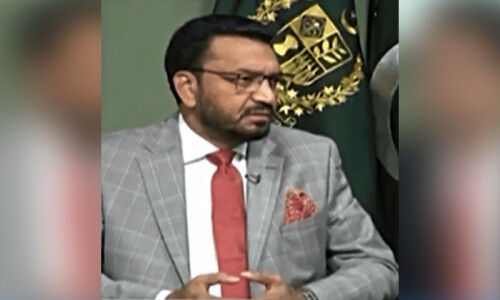The Islamabad High Court on Wednesday directed caretaker Prime Minister Anwaarul Haq Kakar to appear before the court on Nov 29 if he doesn’t secure the recovery of more than 50 allegedly missing Baloch students.
Justice Mohsin Akhtar Kayani passed these orders while hearing a case regarding the implementation of the recommendations of the Commission of Inquiry on Enforced Disappearances.
The commission was established in 2011 to trace missing persons and fix responsibility on the individuals or organisations responsible for it.
Former Prime Minister Shehbaz Sharif had also appeared before the IHC in a similar case in September last year, responding to the court’s directive to ensure the recovery of missing persons or appear in court if unsuccessful.
In the hearing, he assured the IHC of all-out efforts for the recovery of the missing persons, promising that he would not make any “lame excuse”.
Around a month ago, in an interview with BBC Urdu, interim premier Kakar had claimed that according to a UN sub-committee’s estimates, around 50 people had been forcibly disappeared in Balochistan.
“Sometimes, we receive complaints in which they give us 5,000 names claiming they are missing. [They are] not ready to accept any UN best practices on collection of data of missing persons,” the interim PM had said, adding the issue is used as a “propaganda tool” against the state.
The hearing
At the outset of the hearing, Assistant Attorney General Usman Ghumman presented a ministerial report on the Baloch missing persons, a report that the court returned, expressing displeasure. “The prime minister and interior minister are from Balochistan,” said Justice Kayani. “They should be empathetic to this matter, considering it involves Baloch students.”
The court then summoned Additional Attorney General Munawar Iqbal Dugal and took a brief recess.
Justice Kayani mentioned that the case had previously been heard by former IHC CJ Athar Minallah, noting that a commission was formed per the court’s orders, and the matter of enforced disappearances was referred to the federal government.
“The prime minister should have understood, and we expected he would say these are our children,” remarked Justice Kayani.
The judge noted that the former prime minister was also summoned, along with several other high-profile individuals connected to the case. Expressing frustration, he lamented the lack of progress despite efforts.
He expressed concern about the commission on enforced disappearances, stating it had not carried out any meaningful work. “The court has to do its job anyway and ensure the implementation of its orders,” he asserted.
Justice Kayani highlighted that even on the 21st hearing of the case, the court found itself at the same point. “We thought things would change gradually and people would return to their homes. And this was the responsibility of the state to ensure people reached their homes,” he added.
He mentioned that the prime minister, as well as the ministers for interior, human rights, and defence, would be summoned. “This was to be done by the executive, but the court is doing it.”
“Should we refer this matter to the United Nations and cause an insult to our country?” the judge asked, expressing concern about the increasing number of missing people.
He remarked, “The minister for defence and the minister for interior must be asked to appear before the court, as their appearance won’t make any difference.”
Justice Kayani stressed that 55 missing Baloch students must be recovered in light of the recommendations of the commission; otherwise, the premier must appear before the court on Nov 29.
















































Dear visitor, the comments section is undergoing an overhaul and will return soon.